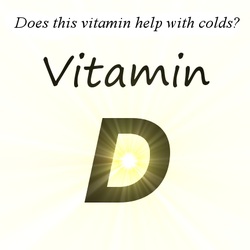
Once again the headline of a study is somewhat misleading. A new study on vitamin D and colds came out. This study showed vitamin D was little to no help with colds and the headline read, "Vitamin D No Help For Colds, Study Suggests". This is a nice headline, but what did this study prove and disprove? Did it really show that Vitamin D is no help for colds?
There are several things in this study that I looked at. First the participants were given monthly shots of 100,000 IU. This is good because we know that everyone in the study took the vitamin D (compliance can be a problem) that was supposed to. This also means that the people who got the shots only got about 3,334 IU's per day which sounds like a lot less than 100,ooo IU. The second thing I saw was that the vitamin D raised their blood levels from 29 ng/ml (nano-grams per milliliter ) to 48 ng/ml over the course of the study. The study started in the spring (when vitamin D levels would be at their lowest) and ended in the fall (when vitamin D levels would naturally be higher). All of these observations are important and we now have to ask ourselves some questions. What were the blood levels in the winter when most people get sick? What if someone started with lower levels of vitamin D? Would it have helped them to take more? What if 48 ng/ml is not high enough to get the immune enhancing effects of vitamin D?
We know from other studies on bone health and cancer that you want your blood levels to be between 70 ng/ml and 80 ng/ml. Would this level of vitamin D help our immune systems?
What this study does show us is that raising your blood levels of vitamin D from about 30 ng/ml to about 50 ng/ml does little to help our immune system stop colds from happening. This, however, is a long way from proving that Vitamin D does not help with frequency of colds at any level. It also does not disprove that bringing up levels of vitamin D in someone who is very deficient would be helpful in lessening the frequency of colds.
You can see the whole article @: http://www.huffingtonpost.com/2012/10/02/vitamin-d-colds-upper-respiratory-tract-infection_n_1932922.html
There are several things in this study that I looked at. First the participants were given monthly shots of 100,000 IU. This is good because we know that everyone in the study took the vitamin D (compliance can be a problem) that was supposed to. This also means that the people who got the shots only got about 3,334 IU's per day which sounds like a lot less than 100,ooo IU. The second thing I saw was that the vitamin D raised their blood levels from 29 ng/ml (nano-grams per milliliter ) to 48 ng/ml over the course of the study. The study started in the spring (when vitamin D levels would be at their lowest) and ended in the fall (when vitamin D levels would naturally be higher). All of these observations are important and we now have to ask ourselves some questions. What were the blood levels in the winter when most people get sick? What if someone started with lower levels of vitamin D? Would it have helped them to take more? What if 48 ng/ml is not high enough to get the immune enhancing effects of vitamin D?
We know from other studies on bone health and cancer that you want your blood levels to be between 70 ng/ml and 80 ng/ml. Would this level of vitamin D help our immune systems?
What this study does show us is that raising your blood levels of vitamin D from about 30 ng/ml to about 50 ng/ml does little to help our immune system stop colds from happening. This, however, is a long way from proving that Vitamin D does not help with frequency of colds at any level. It also does not disprove that bringing up levels of vitamin D in someone who is very deficient would be helpful in lessening the frequency of colds.
You can see the whole article @: http://www.huffingtonpost.com/2012/10/02/vitamin-d-colds-upper-respiratory-tract-infection_n_1932922.html

 RSS Feed
RSS Feed